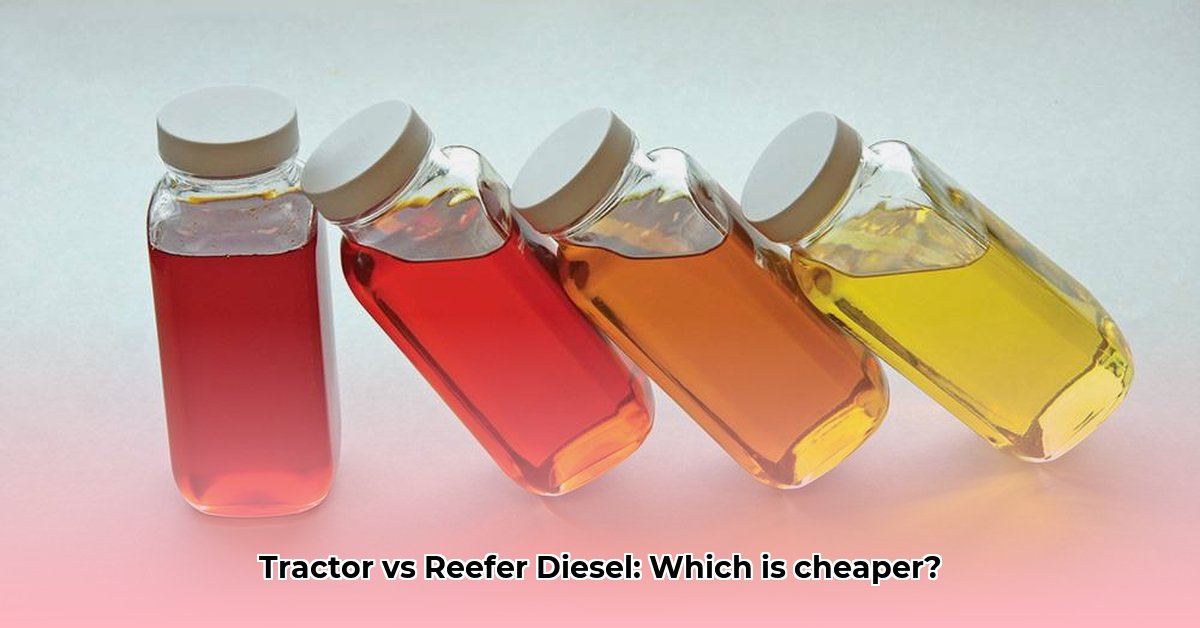
Understanding the Key Differences Between Tractor and Reefer Diesel
Choosing the right diesel fuel is crucial for efficient fleet operation and regulatory compliance. The seemingly simple choice between tractor diesel (for on-road vehicles) and reefer diesel (for refrigeration units) harbors significant financial and legal implications. This guide provides actionable steps to avoid costly mistakes. Incorrect fuel usage can lead to hefty fines, engine damage, and operational downtime.
The Taxing Truth: A Major Cost Difference
The primary difference between tractor and reefer diesel lies in taxation. Tractor diesel, used to power your over-the-road trucks, is subject to significant fuel taxes, increasing your fuel costs at the pump. Reefer diesel, used in off-road equipment like refrigeration units, typically avoids these taxes, resulting in considerable cost savings for fleets with large reefer operations. Did you know that this tax difference can amount to hundreds, even thousands of dollars annually for large fleets?
Visual Identification: Color-Coding and Beyond
While often dyed different colors (tractor diesel is usually clear, while reefer diesel is often dyed red), relying solely on color for identification is risky. Regulations frequently mandate fuel dyeing to distinguish fuel types, acting as a visual warning system. However, always verify fuel type via the label on the fuel dispenser or delivery tank. Never assume based on color alone.
Fuel Performance: Temperature and Additives
Reefer diesel is specifically formulated to withstand colder temperatures. Its lower viscosity and added anti-gelling agents prevent it from thickening and clogging in freezing conditions. Tractor diesel lacks these cold-weather additives, making it unsuitable for reefer units operating in low temperatures. Using the wrong fuel in a reefer unit can lead to costly repairs or complete system failure. How much does a reefer unit repair cost your bottom line? The number is substantial.
Legal Ramifications: Compliance is Paramount
Using the incorrect fuel type carries significant legal repercussions. Using dyed reefer diesel in an on-road vehicle is easily detectable during inspections and results in substantial fines (often thousands of dollars). Conversely, while less likely to trigger penalties, using tractor diesel in a reefer unit is inefficient and may lead to decreased operational performance. Compliance is crucial to avoid legal penalties and ensure smooth operations.
A Step-by-Step Guide to Effective Fuel Management
To minimize risks and ensure efficient fleet management, follow these steps:
Comprehensive Driver Training: Conduct thorough training to ensure drivers can reliably distinguish between fuel types. This training should include visual identification (beyond just color), label reading, and an understanding of the consequences of misuse. Regular refresher courses are recommended.
Clear and Unambiguous Labeling: All fuel tanks, pumps, and storage containers must be clearly and accurately labeled, using large, highly visible labels leaving no room for misinterpretation. Ambiguity in labeling is a significant risk factor.
Invest in Fuel Management Systems: Implement advanced fuel management systems to monitor fuel usage, detect inconsistencies, and prevent misuse or theft. These systems provide real-time data and alerts, enabling prompt action.
Regular Inspections and Maintenance: Conduct frequent inspections of fuel tanks and lines to detect leaks, contamination, or other issues early, preventing larger problems from developing. These inspections must be documented and part of your fleet maintenance plan.
Meticulous Record Keeping: Maintain detailed records (digital is preferable) of all fuel purchases, consumption, and any maintenance related to the fuel system. This documentation is crucial for audits, regulatory compliance, and internal accounting.
Risk Assessment Matrix: Potential Problems and Mitigation Strategies
| Action/Technology | Likelihood | Impact | Mitigation |
|---|---|---|---|
| Using Reefer Fuel On-Road | Very High | Catastrophic (fines, severe engine damage) | Comprehensive driver training, robust fuel management systems, highly visible labeling. |
| Using Tractor Fuel Off-Road | Low | Moderate (inefficiency, potential system damage) | Clear labeling, effective communication, driver training. |
| Improper Fuel Handling | Moderate | Moderate (contamination, equipment damage) | Regular checks, fuel tank maintenance, strict handling procedures. |
The Future of Fuel: Ongoing Research and Considerations
The fuel landscape is constantly evolving. Research into alternative fuels and ongoing changes to emission standards will influence future fuel formulations and regulations. Staying informed about industry updates and best practices is paramount for proactive fleet management. What new fuel technologies could impact your fleet in the next 5 years?
Conclusion: Prioritize Prevention over Remediation
Choosing the right fuel isn't just about cost; it’s about long-term operational efficiency, regulatory compliance, and maintaining the health of your equipment. By emphasizing preventative measures and adhering to best practices, you'll significantly reduce risks, avoid costly errors, and keep your fleet running efficiently and profitably. Proactive fuel management is a sound investment that provides long-term cost savings and avoids potentially crippling legal and operational issues.